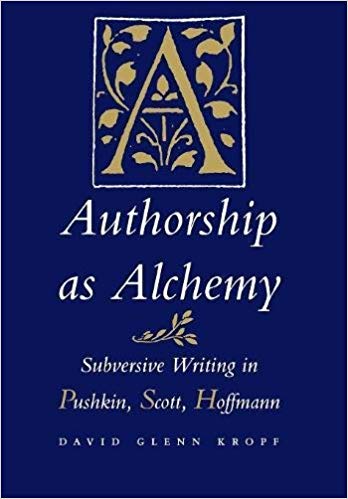David Glenn Kropf
writer · philosopher · critic
Authorship as Alchemy
Subversive Writing in
Pushkin, Scott, Hoffmann
by David Glenn Kropf
“What is an author?” This book is an attempt to answer Michel Foucault’s provocative question. With great subtlety, Kropf examines the relationship between personal identity, the actual person of the writer, and the “author” projected as a matter of socialized construction.
David Glenn Kropf received his PhD in Comparative Literature from Stanford University.
The book is a marked advance beyond previous conceptualizations because of the depth and nuance with which Kropf demonstrates that self-identity is not a single transcendental unity. A term he draws on to describe self-identity is “hecceity,” borrowed from Gilles Deleuze and Félix Guattari. They use it to indicate that the unique “thisness” defining a thing or person lies not in something intrinsic to that thing or person, but rather in the specific constellations that connect it to its surroundings, constellations that are liable to change.
This concept gives Kropf a useful handle on the instability, changeability, and above all multiplicity of personal identity and on the various ways with which society tries to fix it.
The first chapter addresses the seductions of a libertine as a mode of constituting identity in ways that free it from socially normative codes of behavior. This allows Kropf to formulate a definition of subversion that is used in succeeding chapters to examine the work of Alexander Pushkin, Water Scott, and E.T.A. Hoffmann.
The second chapter focuses on the conventions of authorship (copyright, criticism, autobiography) developed in the Romantic period.
The third chapter considers writers’ strategies—such as anonymous and pseudonymous writing—to subvert the rigidity of the connection between themselves and their previous “deeds.”
The final chapter is cast in the form of a fugue, rearticulating the observations and tensions of the preceding chapters and presenting a textual milieu of its own in which the strategies associated with the libertine, the author, and the novelist come to interconnect and reveal themselves as a means of artistic production. The result is what Kropf calls the “artist”: a figure who brings this study full circle, for rather than offering an answer to Foucault’s question the artist subverts it by telling us what the author is not.

“This book, a contribution both to literary theory and to textual analysis, will be of interest to literary scholars of all persuasions, since it touches on weighty issues that figure at the center of current critical debate. Kropf draws our attention, in a highly lucid and sophisticated manner, to the important distinction between the writer and the author and to the way in which the notion of authorship becomes destabilized through a variety of literary tactics. Kropf is a brilliant reader of texts with an eye for the telling detail, and his prose is clear, graceful, and precise.”
—Maria Tatar, Harvard University

